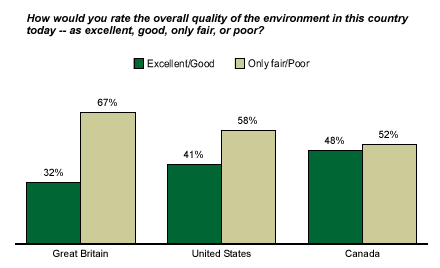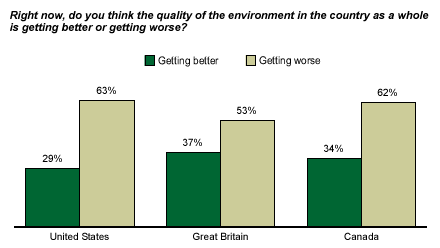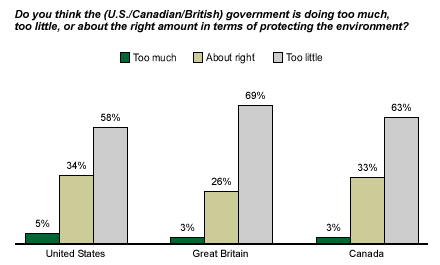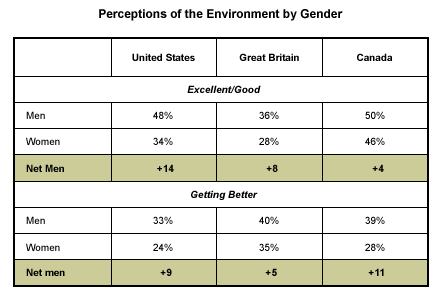Assessing environmental quality is a complex, sometimes ambiguous enterprise. And that's how the experts see it. Ask the public at large to rate the environment, and it must rely on limited impressions, second-hand reports, and an imperfect sense of how environmental quality compares across countries, and across time.
Yale University researchers have developed what they call a "composite profile" of environmental conditions in 146 countries around the globe. They do so by integrating data that tracks natural resource endowments, past and present pollution levels, environmental management efforts, and "the capacity of a society to improve its environmental performance" into 21 indicators of environmental sustainability. Each country's scores on the 21 indicators are then weighted and averaged to create an Environmental Sustainability Index (ESI) score. Their latest conclusions -- discussed in the 2005 Environmental Sustainability Index report -- can be compared with recent Gallup data* on Americans', Canadians', and Britons' ratings of environmental quality in their respective countries.
The polling results in the United States and Great Britain are decidedly bleak, but in Canada as well a majority of respondents offer less-than-positive assessments of their nation's environmental conditions.
Most residents describe the overall quality of the environment in their countries as "only fair" or "poor," rather than "excellent" or "good." The combined only fair/poor figure is 67% in Great Britain, 58% in the United States, and 52% in Canada.

Also, 63% of those living in the United States, 62% in Canada, and 53% in Great Britain are pessimistic about the trend in environmental conditions, saying they are "getting worse."

In contrast to these negative assessments, the Yale report ranks Canada sixth worldwide in environmental stewardship, with an ESI score of 64.4. Although higher scores are associated with a superior ability to maintain favorable environmental conditions, the United States and United Kingdom fall within the mid-range of scores -- the United States ranks 45th with a score of 52.9 and the United Kingdom ranks 65th with a score of 50.2.
Demand for More Environmental Protection Effort
Residents of all three countries think their leaders are doing too little to protect the environment. That's a conclusion that the Yale researchers -- who observe that no nation scores very high or very low on all 21 indicators, or has achieved environmental sustainability -- would agree with.
With a Republican serving as U.S. president -- and many environmental organizations highly critical of his environmental policies -- some might expect Americans to be especially negative about their own government's level of environmental protection. A majority of Americans say that the government is doing "too little" to protect the environment, but on a relative basis, fewer Americans than Canadians or Britons believe their government falls short. Fifty-eight percent of Americans say the government is doing too little, versus 63% of Canadians and 69% of Britons.

Environmental Conditions Trouble Women More
Environmental assessments are uniformly negative among the major demographic subgroups in each country -- by age, gender, level of education, level of income, and region. But the degree of negativity varies some by gender.
In all three countries, but especially in the United States, men are somewhat more positive than women are about environmental conditions. Most notably, 48% of American men, but only 34% of women, describe current environmental conditions as excellent or good -- a 14-point gender gap. In Great Britain, there is an eight-point gender gap on this question, while in Canada, men and women are about equal.
In terms of the outlook for the environment, however, Canadian men are significantly more optimistic than are Canadian women. There is an 11-point gap (39% of men vs. 28% of women) in the percentage saying the environment is getting better. This gap is nine points in the United States and five points in Great Britain.

Bottom Line
Relying on rigorous objective assessments, the Yale 2005 Environmental Sustainability Index finds that all 146 countries reviewed have room for improvement in their environmental stewardship; however, on a relative basis, Canada is among the top performers. The United States and the United Kingdom are about average, at least on par with several western European countries.
These conclusions are not reflected in Gallup's public opinion data, which show that majorities in Canada, the United States, and Great Britain express negative attitudes about environmental conditions in their respective countries, with Canadians only slightly less negative than Americans and Britons in this respect. And Canadians are even more likely than Americans to believe their country is doing too little to protect the environment.
*Results in the United States are based on telephone interviews with 1,004 national adults, aged 18 and older, conducted March 7-10, 2005. For results based on the total sample of national adults, one can say with 95% confidence that the maximum margin of sampling error is ±3 percentage points. The survey was conducted by Gallup USA.
Results in Canada are based on telephone interviews with 1,006 national adults, aged 18 and older, conducted April 11-17, 2005. For results based on the total sample of national adults, one can say with 95% confidence that the maximum margin of sampling error is ±3 percentage points. The survey was conducted by Gallup Canada.
Results in Great Britain are based on telephone interviews with 1,012 national adults, aged 18 and older, conducted April 5-18, 2005. For results based on the total sample of national adults, one can say with 95% confidence that the maximum margin of sampling error is ±3 percentage points. The survey was conducted by Gallup UK.
In addition to sampling error, question wording and practical difficulties in conducting surveys can introduce error or bias into the findings of public opinion polls.
